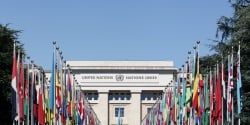Published: 09.11.2022

- The Committee on World Food Security is working on "Voluntary Guidelines on Gender Equality and the Empowerment of Women and Girls in the Context of Food Security and Nutrition."
- The U.S. and the European Union have blocked the agreement by demanding that the document include terms referring to gender ideology, including "reproductive and sexual rights," among others.
- Some UN countries refused to sign the agreement in this form.
- The U.S. and the EU were backed by the UN Commissioner for Human Rights, who, citing a resolution that has caused much controversy among UN states and non-binding opinions from UN experts, declared the disputed issues already "settled."
- In fact, the topics of "gender identity" and "sexual and reproductive rights" are among the most controversial issues causing a stir in UN debates.
- The Committee on World Food Security plans to return to negotiating an agreement in 2023.
The Committee on World Food Security (CFS) was established in 1974 as an intergovernmental body to serve as a forum within the United Nations system to review and track policies on global food security, including production and physical and economic access to food.
The Committee's October work focused on developing a UN agreement on a set of international guidelines on food security. The agreement under development is to be titled "Voluntary Guidelines on Gender Equality and the Empowerment of Women and Girls in the Context of Food Security and Nutrition." Work on the document was halted because the United States and the European Union, which are taking part in the work, insisted that the content of the agreement also include issues relating to transgenderism and abortion, among others.
The US and the EU blocked the agreement, indicating that they would only accept an agreement that included such terms as "various and intersecting forms of discrimination," "women in all their diversity," and "sexual and reproductive health and rights." Although these terms do not have a uniform and precise definition, they have been consistently introduced into various international documents - agreements resolutions, positions - over the years. Subsequently, UN agencies, international organizations, including the EU, and large NGOs promote them through references to the acceptance of transsexualism, gender ideology or abortion. This form of food security agreement was opposed by some UN countries, including Indonesia, China, Russia, Sudan, Cameroon, Malaysia and the Holy See.
The confusion over the inclusion of ideological terms in the document caused the UN High Commissioner for Human Rights to speak out on the issue. In a statement, he supported the position of the US and the EU, saying that the disputed issues "as to the content of the principle of non-discrimination" are already accepted by all countries in UN General Assembly resolutions anyway. He also cited Resolution 67/168 in which it recognized sexual orientation and gender identity as prohibited grounds for discrimination. However, the commissioner failed to mention as part of his intervention that more than 50 UN countries have consistently opposed the language contained in the resolution, and as many as 58 countries have voted against the inclusion of "sexual orientation and gender identity" in its content. Whenever topics related to gender ideology, gender questioning, or alleged "reproductive and sexual rights" come up at the UN, they cause a significant stir among UN delegations, confirming that, contrary to the Commissioner's wishes, these issues cannot be considered "settled." On the contrary, they are topics that generate some of the greatest controversy in debates at the UN.
"The Office would like to emphasize that the UN human rights treaty bodies interpret the principle of non-discrimination and equality as including discrimination on the basis of sexual orientation, gender identity and intersex status," reads the Commissioner's statement, which cites UN expert opinions in a way that unfoundedly suggests they are binding on states. Meanwhile, human rights conventions nowhere explicitly refer to "sexual orientation" or even less to "gender identity." UN human rights experts say these concepts should nevertheless be accepted as human rights categories alongside widely accepted non-discrimination categories such as race, gender and religion.
"The objection is not to the desire to protect certain specific groups from discrimination per se, but to the attempt to force UN states to recognize the ideological concept of gender. It should be remembered that the principle of non-discrimination operates in its broadest formulation and includes the prohibition of discrimination against anyone for any reason. The enumeratively listed race, gender, etc., which appear in various legal acts are only examples, which never constitute a closed catalog," stresses Anna Kubacka of the Ordo Iuris Center for International Law.
The Committee on World Food Security has agreed to continue negotiations on the "Voluntary Guidelines on Gender Equality and the Empowerment of Women and Girls in the Context of Food Security and Nutrition" in the coming months, in hopes of reaching an agreement at the next session in 2023.
Source: C-Fam, https://c-fam.org/friday_fax/u-s-and-eu-hold-food-reliezłowf-hostage-to-lgbt-agenda/

During Holy Week, when we remembered the martyrdom of Jesus, many Poles heard about the innocent death of 9-month-old Felek (such an altered name was given to him by Gazeta Wyborcza journalists). Potassium chloride – a substance used to carry out death sentences – was injected into the heart of the boy who was due to be born any day.

• Gazeta Wyborcza published an article titled "Ordo Iuris Wants the Constitutional Court to Delete the Premise of Endangering a Woman’s Health. Prof.

17.04.2025
• The Ordo Iuris Institute has prepared an opinion for the UN as part of a thematic report on surrogacy and its impact on the rights of women and children.

• Representatives of Ordo Iuris took part in the second round of consultations ahead of the 58th Session of the UN Commission on Population and Development (CPD58) on global health policy.